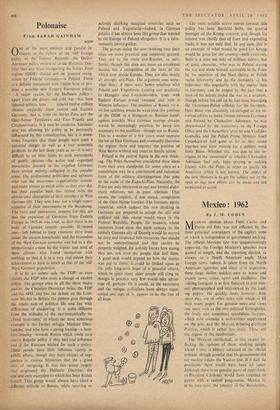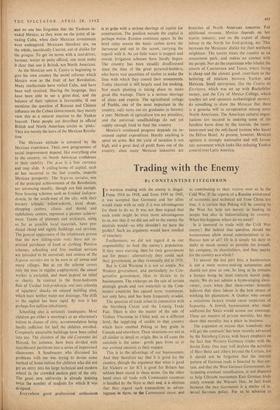Mexico : 1962
By J. M. COHEN
MEXICAN opinion about Fidel Castro and Punta del Este was not reflected by the three principal newspapers of the capital, none of ■shich is independent of government backing. The official Mexican line was unquestioningly approved, the Foreign Minister's speeches were quoted at length, and the reporting slanted, as always, to a North American angle. Most foreign news, indeed, is taken from the North American agencies; and since It is expensive, these large dailies quickly pass to home and society news, crime, sport and feuilleton. fhe visiting foreigner is at first flattered to find him- self photographed and interviewed by the lead- ing papers. He quickly finds, however, how .short they are of other news with which to fill their man ■ pages. For genuine news and %. iews one must turn to the two political fortnightlies, the lively and sometimes scandalous Siempre, which now contains a well-written supplement on the arts, and the Marxist debating-platform Politico, which is rather less lively. These are the organs of the intellectuals.
The Mexican intellectual, in this respect re- flecting the opinion of those working people whom I met, is bitterly ashamed of the official attitude. though grateful that his government did not meekly follow the Yankee line. If it had, he proclaims, there would have been an upset. Although there is no genuine party of opposition, ex-President Ciirdenas would have returned to power with a radical programme. Mexico is, in its own eyes, the country of the Revolution, and no one has forgotten that the Yankees in- vaded Mexico, as they were on the point of in- vading Cuba, when their- Mexican investments were endangered. Mexicans therefore are, on the whole, uncritically Castrist, out of dislike for the gringos. To get on terms with a taxi-driver, barman, waiter or petty official, one must make it clear that one is British, not North American.
As the Mexican sees it, Castro is beginning to give his own country the social reforms which Mexico won as the fruit of her Revolution. Many intellectuals have visited Cuba, and have been well received. Sharing the language, they have been able to see a great deal, and the balance of their opinion is favourable. If one mentions the question of Russian and Chinese influence on the Cuban Government, they merely view this as a natural reaction to the Yankee boycott. These people are described in official British and North American circles as 'pinks.' They are merely the heirs of the Mexican Revolu- tion.
The Mexican attitude is coloured by the Mexican experience. Their own programmes of social improvement depend. like everything else in the country, on North American confidence in their stability. l'he peso is a free currency and may slide. A calling-home of capital, such as has occurred in the last months, imperils Mexican prosperity. The Seguros societies, one of the principal achievements of the Revolution, are advancing steadily, though not fast enough. New housing schemes such as Unidad Indepen- dencia, to the south-west of the city, with their nursery schools; infant-schools, local shops, shopping centres, clinics and dental and ophthalmic centres, represent a pioneer achieve- ment. Teams of planners and architects, using so far as possible local materials, have pro- duced cheap and sightly buildings and services. The general appearance of the inhabitants proves that the new sliding-scale rents have not re- stricted purchases of food or clothing. Pension schemes, schooling and free medical services are intended to be universal; and centres of the Scgitros sociales are to be seen in all towns and many villages. But as yet the scheme covers only the man in regular e.nployment; the casual worker is excluded, and must depend on relief or charity. In contrast to the three-bedroom flats of Unidad Independencia one sees colonies of squatters' shacks on unused building sites, which have neither water nor drainage. The drift to the capital has been rapid. By now it has perhaps five million inhabitants.
Schooling also is seriously inadequate. Most children get either a morning's or an afternoon's tuition in classes of sixty, accommodation being hardly sufficient for half the children enrolled. Completely unsuitable buildings have been called into use. The cloisters of the old ,Convento del Merced, for instance, have been divided with matchboard partitions into a series of improvised classrooms. A headmaster who discussed his problems with me was trying to devise some method of home tuition for children who did not get an entry into his large technical and modern school in the crowded eastern part of the city. The great new university is already training twice the number of students for which it was designed.
Everywhere great professional enthusiasm is at grips with a serious shortage of capital for construction. The position outside the capital is perhaps worse. Erosion continues apace. In the brief rainy season the water rushes down the barrancas and out to the ocean, carrying the topsoil with it. As yet little water is trapped and stored. Irrigation schemes have hardly begun. The country has been steadily disafforested since the time of the great pyramid-builders, who burnt vast quantities of timber to make the lime with which they coated their monuments. Today charcoal is still largely used for cooking. Not much planting is taking place to make good this wastage. There is a serious shortage of plans and experts. The agricultural college of Puebla, one of the most important in the country, only turns out six graduates in forestry a year. Methods of agriculture too are primitive, and the universal smallholdings do not yet supply enough food to feed the country.
Mexico's continued progress depends on in- creased capital expenditure. Hardly anything is spent on arms. But the yield of taxation is not high, and a great deal of profit flows out of the country, since many Mexican industries are branches of North American concerns. For additional revenue. Mexico depends on her tourist industry, and on the export of cheap labour to the North for fruit-picking, etc. This increases the Mexicans' dislike for their northern neighbour. The tourist treats the country as an amusement park, and makes no contact with the people. Nor do the expatriates who inhabit the resorts of Cuernavaca and Taxco, where living is cheap and the climate good. contribute to the bettering of relations between Yankee and Mexican. Small enterprises, like the Centro de Escritores, which was set up with Rockefeller money, and the City of Mexico. College, which teaches art and sponsors archzeological surveys. do something to show the Mexican that there is a genuine will to co-operation among some North Americans. The American cultural organ- isations too succeed in undoing some of the heedless harm done by the tourists, the remit- tance-men and the soft-faced tycoons who haunt the Hilton Hotel. At present, however, Mexican opinion is strongly nationalist and will favour any movement which looks like reducing Yankee control over Latin America.



































 Previous page
Previous page